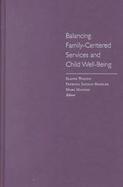Balancing Family-Centered Services and Child Well-Being Exploring Issues in Policy, Practice, Theory, and Research
- Binding: Hardcover
- Publisher: Columbia Univ Pr
- Publish date: 04/01/2001
Description:
Introduction, by Marc Mannes, Elaine Walton, and Patricia Sandau-Beckler Contributors 1. Family-Centered Services: A Typology Brief History, and Overview of Current Program Implementation and Evaluation Challenges, by Peter J. Pecora, Kellie Reed-Ashcraft, and Raymond S. Kirk A Program Typology of Family-Centered Services History of Family-Centered Services Program Limitations and Policy Pitfalls Selected Program Implementation Challenges in Family-Centered Services 2. Values and Ethics for Family-Centered Practice, by John P. Ronnau Theoretical Foundation The Impact of Values in Practice Evolution of Values in Family-Centered Services Historical Backdrop Values That Direct Family-Centered Services Family Plays an Essential Role in Child Development The Family Is Part of a System Clients Are Colleagues Strengths Are to Be Emphasized Home Is the Primary Service Setting The Family's Needs Determine Services The Family and Workers Operate in the Community 3. Cultural Competency in Providing Family-Centered Services, by Rowena Fong History of Culturally Competent Practice Culturally Competent Social Work and Family-Centered Practice Assessing Family-Centered Services for Ethnic Families Planning Culturally Competent Family-Centered Services Cultural Values as Guideposts to Service Development 4. A Conceptual Framework for Family-Centered Services, by Elaine Walton Family Systems Theory Ecological Theory Social Work Models Strength-Based Perspective Empowerment Theory A Conceptual Framework: Integration of Theories 5. Family-Centered Assessment and Goal Setting, by Patricia Sandau-Beckler Expanded Roles of Family Members as Experts on Their History and Challenges Use of Self in Relationship to Family-Centered Practice Principles Maintaining a Nonjudgmental Stance Preparing for Family-Centered Assessment Home Observation Ethical Considerations of Working in the Family's Home Family-Centered Assessment Process Connecting Family Assessment to Goal-Setting Activities Collaborative Team Building to Support Family Assessment and Goal Setting 6. Well-Being and Family-Centered Services: The Value of the Developmental Assets Framework, by Marc Mannes Some Implications and Effects of Attending to Safety Permanency, and Well-Being for Child and Family Services Family-Centered Reforms and Child and Family Services The Empirical Basis for the Developmental Assets Framework The Basis for Defining Thriving Outcomes Measurement of the Developmental Assets and Thriving Indicators Findings Related to the Developmental Assets Framework and Thriving Indicators Adapting the Developmental Assets Framework to Children The Importance of Applying the Developmental Assets Framework to Family-Centered Services 7. Interventions: Hard and Soft Services, by Elizabeth M. Tracy Definitional Issues The Home-Based Worker's Intervention Task Categories of Home-Based Interventions Case Examples Future Issues 8. Formal and Informal Kinship Care: Supporting the Whole Family, by Gary R. Anderson Formal and Informal Support Kinship Family Care Formal Kinship Care Policy Issues 9. Family Group Conferencing: An "Extended Family" Process to Safeguard Children and Strengthen Family Well-Being, by Lisa Merkel-Holguin, with contributions from Kimberly Ribich Historical Roots in New Zealand New Zealand's Legislative Precedence Evolution of Family Group Conferencing The Practice of Family Group Conferencing 10. Targeting the Right Families for Family-Centered Services: Current Dilemmas and Future Directions, by Ramona W. Denby Part 1: The Evolution of Targeting Practices in Family-Centered Services Part 2: Future Direction of Targeting Practices in Family-Centered Services Part 3: Putting the Targeting Criteria Into Action 11. Walking
Expand description

Please Wait

